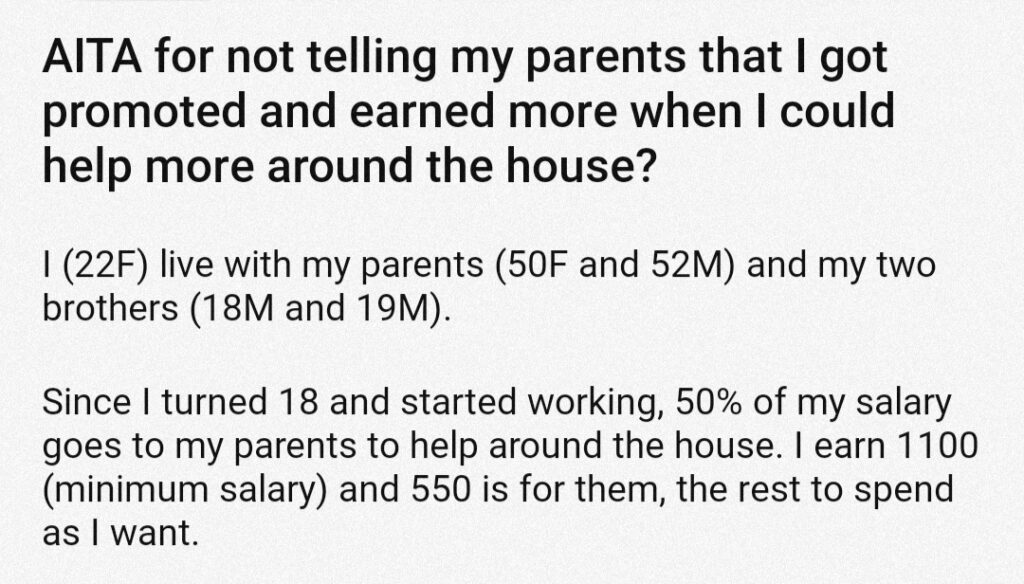Discover various information about Aita For Not Telling My Roommate I Own The House here, hopefully fulfilling your information needs.

AITA for Not Telling My Roommate I Own the House?
“I live in a house with two roommates. I own the house, but I’ve never told them. A few months ago, they started pressuring me into buying a new couch for the living room. They said that the current couch is old and uncomfortable, and they don’t feel comfortable having people over.
I don’t really mind the couch. It’s a little old, but it’s still in good condition, and I don’t have the money to buy a new one right now. I tried to explain this to my roommates, but they weren’t happy about it. They said that they were paying rent, and they should have a say in how the house is furnished.
I understand their point of view, but I also think I have a right to make decisions about my own property. I don’t want to spend money on a new couch that I don’t need.
AITA for not telling my roommates that I own the house?”
The Importance of Communication in Housemate Relationships
Open and honest communication is crucial in any housemate relationship, especially when it comes to financial matters. By not disclosing your ownership of the house to your roommates, you have created an imbalance of power and information in the household. Your roommates may feel entitled to certain privileges or decisions regarding the property that they would not be entitled to if they knew the truth.
This lack of transparency can lead to resentment and conflict down the road. Your roommates may feel taken advantage of or misled, which could damage the overall harmony of the household. It is important to be upfront and honest with your housemates about your ownership status to avoid any misunderstandings or potential issues.
Legal Implications and Ethical Considerations
In many jurisdictions, landlords have certain legal obligations to their tenants, including the duty to disclose any material facts that could affect the tenancy. These facts may include ownership information, potential hazards, or any other issues that could impact the tenants’ health, safety, or well-being.
Failing to disclose your ownership of the house to your roommates could have legal implications, such as violating tenant rights or breaching contractual obligations. It also raises ethical concerns, as you are withholding information that could have a significant impact on your roommates’ decisions and expectations.
Tips for Navigating the Situation
Communicate Openly and Honestly:
The best way to address this situation is to have an open and honest conversation with your roommates. Explain that you own the house and that you have not told them previously. Be prepared to answer their questions and address any concerns they may have.
Establish Clear Boundaries:
Once you have disclosed your ownership, it is important to establish clear boundaries regarding decision-making and financial responsibilities. Explain that while you value their input, ultimately, you have the final say on matters related to the property.
Be Willing to Compromise:
While it is important to assert your rights as the homeowner, it is also important to be willing to compromise when possible. If your roommates have strong feelings about the couch or other aspects of the house, try to find a solution that meets both your needs.
Seek Legal Advice if Necessary:
If you are unable to resolve the situation amicably with your roommates, you may want to consider seeking legal advice. An attorney can help you understand your rights and obligations as a landlord and provide guidance on how to navigate this situation appropriately.
Frequently Asked Questions
Q: Am I legally obligated to disclose my ownership of the house to my roommates?
A: In some jurisdictions, landlords may have a legal duty to disclose material facts to their tenants, including ownership information. It is advisable to consult with an attorney for specific legal advice in your jurisdiction.
Q: How can I avoid conflict with my roommates over this issue?
A: Open and honest communication is key. Clearly establish your boundaries and be willing to compromise when possible. If necessary, consider seeking legal advice to clarify your rights and obligations as a landlord.
Q: What should I do if my roommates pressure me into spending money on things I don’t want?
A: Politely but firmly assert your boundaries. Explain that you value their input but ultimately have the final say on financial decisions related to the property. If they continue to pressure you, you may need to have a more serious conversation about your expectations.
Conclusion
Navigating the issue of ownership disclosure with roommates can be a delicate matter. Open and honest communication, clear boundaries, and a willingness to compromise are crucial for maintaining a harmonious housemate relationship. Remember, respectful and considerate behavior goes a long way in ensuring that everyone’s needs are met while respecting the rights and responsibilities of all parties involved.
Are you interested in learning more about landlord-tenant relationships or the latest trends in homeownership? Visit our website for more informative articles and expert insights. Bookmark our site and stay tuned for future updates to stay informed and enhance your knowledge about these topics.

Image: www.boredpanda.com
An article about Aita For Not Telling My Roommate I Own The House has been read by you. Thank you for visiting our website, and we hope this article is beneficial.